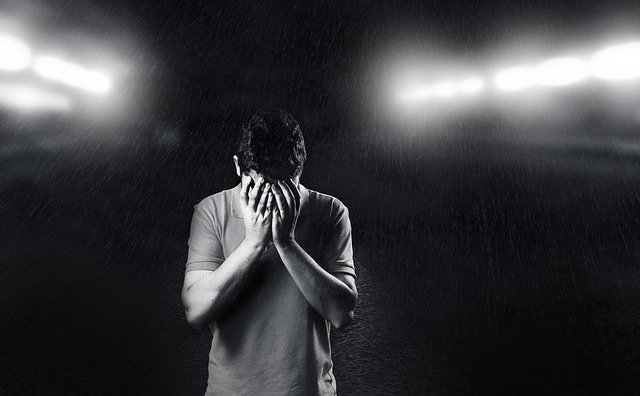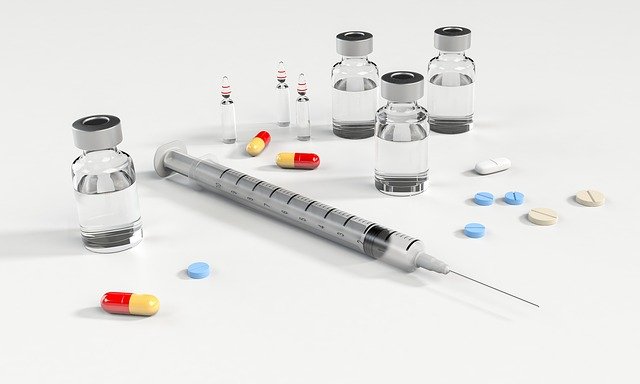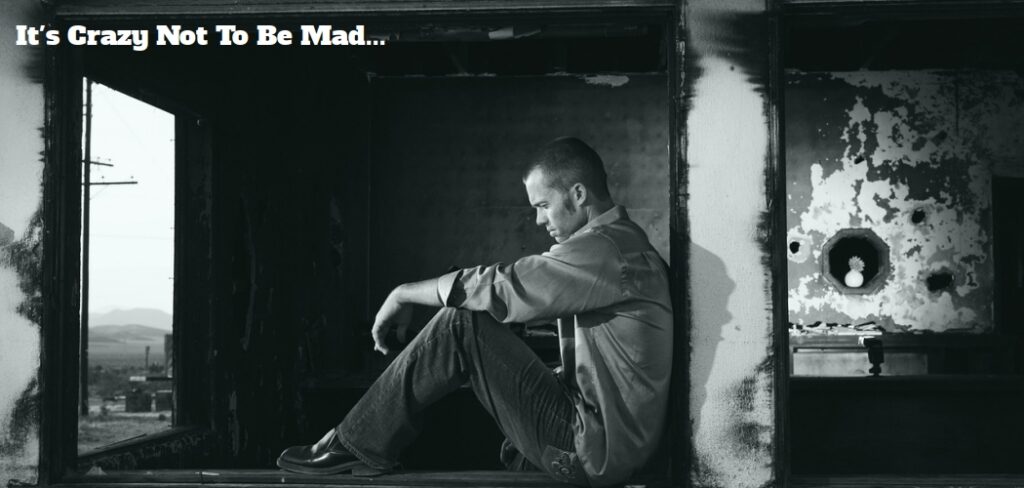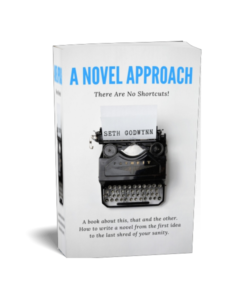It’s Crazy Not To Be Mad!
(The depressing tale of not giving up)
A.P. Atkinson
I once met an American man in Thailand names Dave. We had been introduced to one another by a mutual friend who thought we had some things in common. All of us were motorcyclists, and this American gentleman had been to a social evening at a local bike club where he had knocked out a drunk and annoying Frenchman.
He was a little older than me and had an interesting story to relate about his life. He told me that he had been married to a very attractive, but completely useless, Swedish woman while living back home in the US. He had worked as an airline pilot and had invested in the stock market to the degree that he was financially able to support himself for the rest of his life without working.
He explained that life as an airline pilot was stressful and challenging, but had grown increasingly difficult over the last decade. Pay had been cut, hours extended and he had been reaching the point where he was no longer sure that he wanted to be doing it. His wife refused to find work, wasted her time and lived off of whatever he was earning. His life was no longer one that he felt he wanted to be living.
He told me that one morning they were eating breakfast and he asked her what she’d done to find a job. She laughed at him, and he said that was the last straw. He threw the newspaper down and walked out. He bought a BMW motorcycle and rode off, vanishing into the twisting grey tarmac that wound its way around the world.
He said he never looked back; he travelled on through half the world having one adventure after another. We did have a lot in common, apart from punching annoying French people.

We both had a horrible, awful, terrible life that we felt a need to run away from, both had a BMW motorcycle, and had both riden away from our home countries with no clear idea where we were heading, and very little clue as to what it was that we were doing.
Some years before, I had owned a BMW F800gs with the ultimate goal of escaping London and riding it to freedom. That was scuppered by a gang of local thieves who stole it from outside my house on the second night of me living there. I replaced it with a smaller and more off-road oriented 650cc machine. I slowly discovered it was a better choice and used that machine for my journey instead. I rode her around Europe and then on through the Middle East and into Asia.
But why does a person do something like this? What makes an educated, mature individual give up and ride off into the sunset with everything they own strapped to a lump of German engineering?
Shockingly, the answer to that isn’t that everything in their lives is going well and they’re incredibly happy to be alive. In my case it was exactly the opposite; I was diagnosed with suicidal depression.

Depression isn’t a terribly well-understood mental health issue. It’s generally poorly diagnosed and is very hard to treat. Experiences vary wildly, patients having very different reactions and experiences to the condition.
I had lived in the outskirts of London and had been through a bit of a bad patch that had lasted the entire duration of my life. Anyone working for a living in London knows just how hard it is. I had multiple redundancies behind me, constant difficulty finding work, and a daily struggle to manage to live on the money I was able to earn.
As well as my day job, I ran an online shop selling anything I could scavenge for whatever profit I could rake in. I had no choice but to do this in order to make ends meet. Living in London always felt like a battle to stay alive and I was increasingly feeling that there was no great reason to be fighting for it.
I knew people who were far worse off than me, having fallen into the cracks of the mental healthcare industry.
I once dated a girl who had a paranoid personality issue. She fed it with prescription medication until it finally blossomed into full-blown schizophrenia. I watched her slowly fall apart before me, descending into a deep, dark tunnel that she would never crawl out of. She went from being a slightly confusing, but lively and fun person to a shadow of her former self. She developed agoraphobia, heard voices telling her to kill, and her thoughts were scattered like a bomb had exploded inside her mind. The last time I saw her, I wasn’t able to recognise her, either physically or mentally.
I had a friend who went down the same dark path. She had four daughters and the first two were from an abusive marriage. Her husband, himself a victim of abuse, had often physically attacked her. On one instance he hit her hard enough to fracture her skull and shatter an eye-socket.


This had left her with a diagnosis of post-traumatic shock. She was forcibly loaded with chemicals until she could barely speak and rarely left the sofa out of sheer exhaustion. Her children were put on the at-risk register and there was an attempt to remove them from the household.
I helped her get legal aid and proved that reports were not an accurate reflection of the situation. Once that all died down, her medication was upgraded and she was essentially wiped out. I never really heard from her again, except through her children who reported that she barely moved anymore.
Genuine mental illness is actually very rare. The medical profession and the companies producing ineffective drugs to deal with it would claim otherwise. This is the same industry that previously recommended lobotomies and imprisonment for people with emotional trauma. This is a profession that was attempting to cure emotional problems by hammering a metal rod into your brain through your eye-sockets just a few decades ago.
Real, honest mental illness, where there is an actual defect in the human brain, is far less common than people might imagine. Most of the mental health issues that are diagnosed are simply a reaction to the world we live in.
Depression is a totally normal human adjustment to being trapped in an endless frustrating situation. We see the same condition in animals in zoos when their natural instincts are denied expression. We see it in people all the time when their dreams are going unfulfilled and their time is spent barely surviving.
I was diagnosed by a doctor who looked slightly scared and confused by all this. He asked if I wanted medication and I told him I didn’t. I asked if there was any other, more practical, advice he was able to offer and he just smiled awkwardly and told me I should probably book another appointment.
As someone with first-hand experience of the damage that psychiatric drugs can do to a person, I was extremely wary of putting those kinds of chemicals into my body. So, while drinking a pint of beer, I came up with my own plan to deal with it.
I realised that I was depressed, but I felt that I would have had to have been totally insane not to have been. When I was diagnosed, one of the times, I had been working at a money-lending company. I took them to court for unfair practices after they brought in a new way to rip off customers as a staff policy, and was asked to leave as a consequence of my honesty. I then worked as a regional auditor and was made redundant three months later. Between stolen motorcycles, constant redundancy, homelessness and deaths in the family, I wasn’t feeling terribly positive.
It’s been said that doing the same thing over and over and expecting different results is a true expression of insanity. With that in mind, I decided that I needed to make a change. I looked for the problem, for what it was that was making this so very bad. What was the leading factor in making me feel like not being alive might have been the smarter choice?
I decided it was my whole, entire life that seemed to be the problem. I was making excuses to myself, trying to fit into a life I didn’t want. I could justify that I was there for my family, for my friends, but I couldn’t pretend any longer that I was doing it to build a better life for the future, that I was waiting for an opportunity, or that I was doing something useful.
The fact remained that nothing was going to change if I changed nothing. Like Dave, the American, before me, I threw down my newspaper, got on my BMW and left*. I rode off into the sunset with a fellow rider I met online, and kept riding onwards, leaving behind the stresses, the struggles, the pain and the darkness that had become my reality.
But did it work?
Every mile put things further into perspective. I was leaving behind the crushing weight of living in a system designed to pressure you into spending money you don’t have to impress people you don’t know by buying things you don’t need. It’s a system developed to keep people perpetually miserable and unsatisfied, and to compensate by spending money on products to make themselves feel better about working constantly to earn the money to spend.
It’s a system that’s designed to punish you for being alive until you genuinely wish you weren’t.
The world we live in could be a paradise—it literally makes food for us, cleans the water, purifies the air, and there’s space for us all. Instead, poisoned water is sold to us in plastic bottles that clog the oceans, air is polluted, and food is increasingly made scarce in order to make it profitable. Wars are commonplace, education is failing, and misery is normal.
I started to realise more and more that depression isn’t a mental illness at all, it’s a perfectly natural reaction to living in a cage. Humans are meant to be free, we’re meant to meet our potential and discover the very best of ourselves. Instead we pay taxes, live in poverty and consume useless gadgets, the production of which slowly strangles our world of resources.
The further I rode, the more I came to realise that I wasn’t crazy at all. I was doing the one sane thing left.
Mental health is a growing issue in society and is poorly discussed and even more poorly understood. If you’re fighting this battle, you are never alone.
Many thanks for reading this article. We hope it was interesting, informative and entertaining. Follow us on social media or share our content on your own pages. It helps us grow so we can create more free content to help you.



